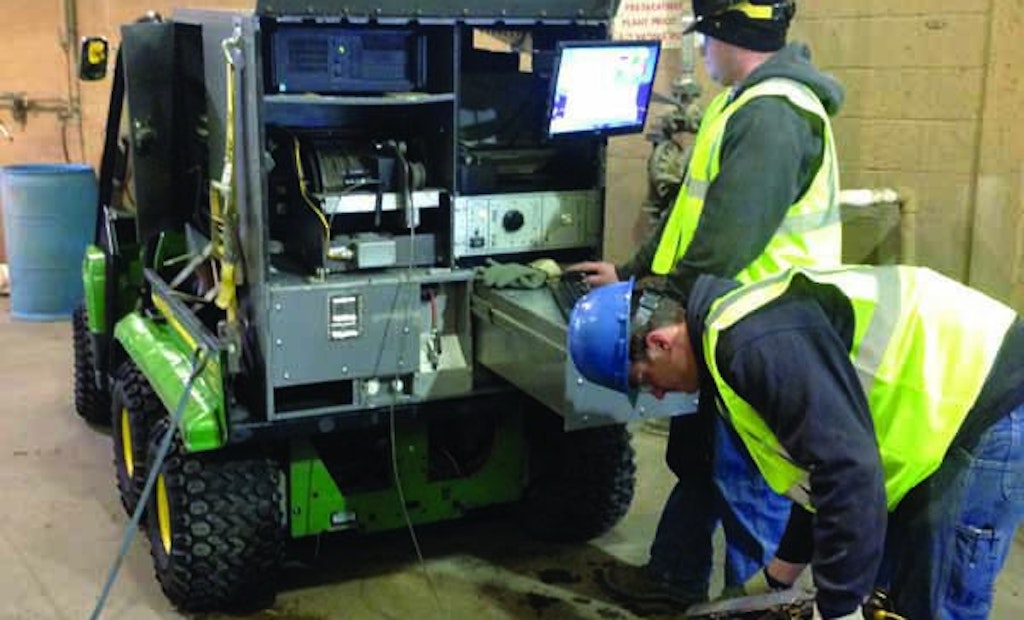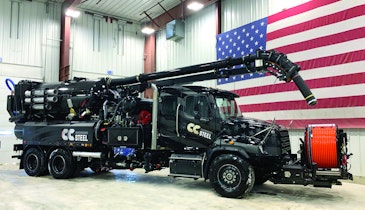
Interested in Location/Detection?
Get Location/Detection articles, news and videos right in your inbox! Sign up now.
Location/Detection + Get AlertsAs much as Hydro-Klean employees rely on the company’s 16 CCTV camera trucks and trailers to perform mainline sewer inspections, there are times when technicians have to make like a light-hitting baseball team and play small ball.
That’s where the CUBE portable mainline camera inspection system, made by R.S. Technical Services, steps in. Purchased in 2011, the small unit helps technicians inspect pipelines located in easements and other hard-to-access locations, says Matt Deutsch, chief operating officer of the company. Based in Des Moines, Iowa, Hydro-Klean does both municipal work (cleaning, inspection and CIPP lining) and industrial cleaning (vacuum work and hydroblasting).
“We do a lot of remote jobs where it’s not easy to go and make a repair,” Deutsch explains. “Or we work in sensitive areas where we can’t get a camera truck in because of the ground conditions, or we inspect sewers along bike paths with a very thin asphalt overlay that’s not designed to handle truck traffic.
“But the CUBE system fits on the back of our John Deere Gator,” he continues. “It’s like having a big camera truck on the back of an all-terrain vehicle. It’s self-contained — everything we need in one small package. We just grab the CUBE and we’re ready to go.” Deutsch also praises the Gator’s capabilities. “It can go just about anywhere — across farm fields and pastures and up different grades and elevations that a truck couldn’t get through,” he says.
The CUBE can carry up to 1,500 feet of camera cable and features a self-contained, onboard generator and MPEG video-recording capability. “We can save inspection videos right onto thumb drives and hand them to customers at the end of the day,” Deutsch says. Housed inside a 1/4-inch-thick, powder-coated and glare-resistant aluminum body, the unit also offers two 500-pound-capacity storage drawers, a high-resolution color monitor and a front-access, 9-gallon pressure washer.
The CUBE also provides Deutsch with something equally valuable: reliability. “Uptime is a No. 1 concern for us,” Deutsch explains. “Uptime is the reason we’re able to keep our doors open for business … and we’ve had no major issues at all with the CUBE.
“If we’re down, we incur the costs associated with that and customers are unhappy,” he adds. “Moreover, there are times when we work in concert with other contractors who can’t do their piece of the puzzle until we do our piece. In those cases, downtime has a domino effect. You don’t want to be that guy.”
Downtime also hurts Hydro-Klean more than some other companies because it pays its employees overtime after they put in an eight-hour day, not after they accumulate a total of 40 hours for the week. “So if they’re out there for more than eight-hours because of a breakdown, we’re basically eating that time — we can’t bill customers for it,” he notes. “So uptime is absolutely critical to us.”
The CUBE also helps technicians maximize productivity, thanks to its ability to maneuver in tight spots, such as inside manufacturing facilities, or more easily gain access to off-road manholes, for example. That helps crews achieve their feet-per-day inspection goals, Deutsch says.
For one project — inspecting and cleaning a mainline sewer — Hydro-Klean crews were able to work in residents’ backyards. In another instance, Hydro-Klean technicians drove the CUBE right through the middle of an acres-big agricultural-manufacturing plant to inspect drainlines.
“The CUBE gives us a way to solve problems like that,” Deutsch notes. “The alternative is to drag a bunch of cable around, and sometimes the places we have to go are too far away for even that. And despite its size, we still get the same quality (images) as a big camera truck.”
The Gator and the CUBE usually travel on a flatbed trailer, but Deutsch points out his crews have also transported the CUBE in the bed of a pickup truck. They use a forklift to get it onto the Gator or into a pickup truck — the unit features openings that accommodate a forklift’s forks.
Training employees to use the CUBE is easy because it operates much like the company’s other full-size camera trucks, outfitted by RST, CUES, Aries Industries, RapidView IBAK and Pearpoint. In addition, the CUBE is compatible with all eight of the various RST pipeline inspection cameras the company owns. Furthermore, the CUBE also serves as a marketing tool.
Word gets around when a company can handle tough jobs, and Deutsch says he periodically gets calls from customers who’ve heard about the CUBE’s capabilities and reputation as a
get-it-done machine.
At a cost of roughly $62,000, the CUBE represents a sizable investment. “Sure, the up-front cost looks expensive,” Deutsch concedes. “But the expense is easier to swallow if you know that it’ll allow you to do projects you otherwise wouldn’t be able to do.
“The CUBE enables us to do jobs we normally couldn’t complete with conventional sewer line inspection equipment,” he says. “It allows us to go after the tough jobs — and those are the ones we want. We want to be the company that solves problems other providers can’t, and the CUBE helps us do that.”





